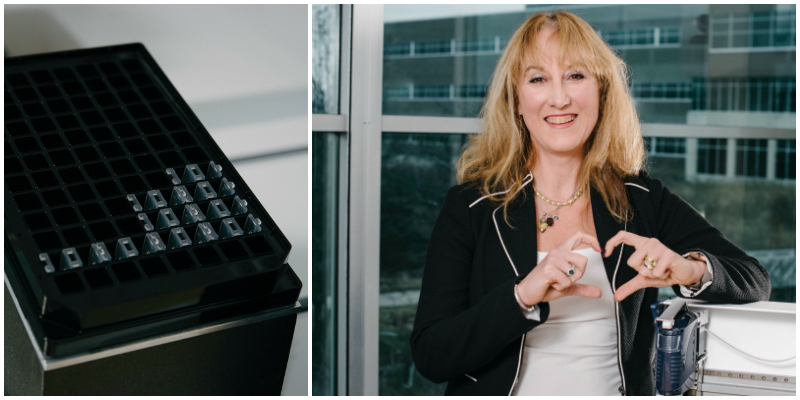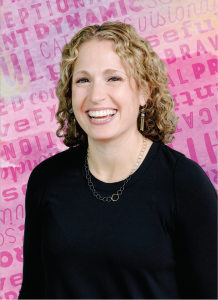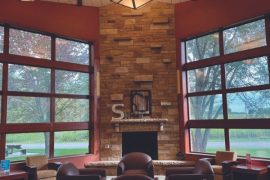By Julia Richards | Photography By Hillary Schave
There are few things so fundamentally mesmerizing as the sound of a heartbeat or the image of the fist-sized muscle ceaselessly pumping in our chests. Ayla Annac, CEO of InvivoSciences, Inc. evokes this sense of wonder in her TEDx talk, delivered in 2018 in England. As the rhythmic sound of a heartbeat thrums in the background, the screen shows a grid of tiny squares, each little box containing a lab-grown human heart tissue. Each miniature heart muscle, incredibly, pulses on its own. While somewhat evocative of Frankenstein, the image is also awe-inspiring.
In the talk, Annac explains what’s happening in the images behind her: With InvivoSciences’ grid of 96 miniaturized heart tissues, each grown from a patient’s own cells, researchers can test different amounts and combinations of drug compounds for toxicity and to see how that individual’s tissue will respond. This pioneering technology could be the future of achievable, affordable precision medicine—and drug development. And it’s happening right here in Madison.
The small biotech company has been awarded funding from the National Institutes of Health and Annac has presented the company’s work all over the country and world.
Personal Connection
Sitting in a glass-walled conference room at InvivoSciences’ headquarters at a research park on Madison’s west side, Annac is warm and earnest as she patiently describes the company she has devoted herself to for the last 19 years. Born and raised in Turkey, for Annac this work is personal. Her father died of heart failure when he was just 53. He had had three heart attacks and the doctors said there were no further treatment options. Unless he could get a heart transplant, he had only eight months to live.
“They said technology was not good enough. There’s nothing they can do,” she says. It was an answer she found unacceptable.
When her father died, Annac was just 19. She postponed her own education so she could support her mother, a homemaker, as well as Annac’s younger brother. She worked while finishing college in Istanbul and post- college got a job at a Turkish pharmaceutical company. Eventually she decided to come to the U.S. to complete an MBA at St. Louis University.
Later, while working for Nestlé Purina in St. Louis, she met two scientists that worked at Washington University, Tetsuro (Ted) Wakatsuki and Elliott Elson, who had developed a way to grow 3D models of heart tissue. She inquired with the duo if this technology could have helped find a treatment for her father, and they said yes. With her business background, Annac helped them secure a patent and develop a business plan. Eventually, the three cofounded InvivoSciences, Inc. in 2001.
They moved the company to Madison in 2005 during a push to attract stem cell companies to Wisconsin.
Pioneering Technology
Many labs grow cell cultures, but InvivoSciences was a pioneer in developing the three-dimensional human micro tissue platform.
Like any muscle in the body, the heart is designed to contract and work, explains Wakatsuki, chief scientific officer at InvivoSciences. “Those kinds of functions cannot be mimicked properly using the two-dimensional cells. So that’s a limitation. But if you introduce the three-dimensional approach you can really mimic the natural state of the heart muscle,” he says.
Originally InvivoSciences used rat or mouse cells to grow the tissue, but with the development of stem cell technology they could use human cells. By applying this stem cell technology, their scientists can revert an adult cell from a patient’s blood or urine sample to a state where it can grow into any type of cell in the body, explains Wakatsuki. From there they reprogram the cells to differentiate into heart cells and then grow these into tissue. In this way the company can grow a patient’s unique heart tissue in the course of about five weeks.
Instead of one-size-fits-all medicine, this individualized approach accommodates differences in patient populations, such as age, gender and genetic makeup, since different people may react differently to drug dosages. “Small trials, customized for the groups of populations [are] going to be more successful because each one of us, you and I—especially our genomic system, our immune system—are not equivalent,” Annac says.
In the future, the technology could help doctors treat individual patients, but currently it is mostly being used to assist with disease research and precision medicine development at the pre-clinical stage by predicting the outcome of clinical trials.
The Spirit of an Entrepreneur
In her work Annac has been tireless. While many people told her she wouldn’t be successful because she was a woman or an immigrant or new to the industry, she didn’t listen to them, but instead to the few who believed in her—many of whom now serve on her board.
She talks of the personal sacrifice required of entrepreneurs, working nights and week- ends, paying others before themselves, investing whatever they have into the company and persevering until they can make it. “Payroll is number-one. You have to make it. And there are years I have not been able to get paid,” she says.
She finds encouragement in her two children, ages 10 and 15, who she says, both like science and never stop believing in her.
When she’s having a hard day Annac says she also turns to her “Tempo sisters” for encouragement, referring to Tempo, the Madison women’s business leadership organization she is a part of. One of the friends she met there, BJ Pfeiffer, calls Annac a “tremendous asset to our community” for her passion not only for her field, but for giving others opportunity. Pfeiffer is founder of the Employability Project, a nonprofit that helps college students who are on the autism spectrum or who have learning disabilities to develop job skills and land internships. Some of the students have trained in lab work at InvivoSciences, and Pfeiffer appreciates how Annac takes the time to show them around and find the best job fit for them. Some have even been hired on as staff.
Annac gives back as well by speaking at the UW–Madison School of Engineering, mentoring students there and serving as a judge in the department’s prestigious Tong Biomedical Design Awards. She wants to see women step into leadership roles and believes in the strength of diverse teams. “[There] will be very difficult challenges we are going to face in the future,” she says. “We cannot exclude any population … Everybody has a contribution, special challenge, special something that they can offer.”
Future Goals
InvivoSciences is looking to continue collaborating with cell manufacturers and those developing biomarkers of drugs to treat various conditions, Annac says. These go well beyond heart disease. Cancer treatments can be especially toxic to the heart, Annac explains, and patients who battle and survive cancer may later be cruelly felled by heart disease. A heart condition that commonly occurs in people with muscular dystrophy can also be affected by drug treatments.
By focusing on these specific populations, smaller clinical trials can be done at much lower cost. Currently the expense of clinical trials is holding back drug development for heart disease, even though it’s the leading cause of death in the U.S.
“If you focus on general populations, the cost of developing the compounds of the drugs is astronomical because you usually need to have thousands of patients to con- firm the efficacy of the drugs and the toxicity/ safety of the drugs,” Wakatsuki explains. By doing smaller targeted studies pharmaceutical companies can more efficiently get drugs approved, which can then potentially be used for treating other conditions.
Still, Annac says that the fact that most pharma teams and venture capital teams are overwhelmingly male poses great challenges for her company in finding funding. According to a report by the National Venture Capital Association, women make up only 11% of venture capital investment partners. She thinks that women-led venture capital teams would be more willing to invest in women-led companies.
Successful entrepreneurship takes working with a lot of different people, finding investors, maybe even collaborating with the competition to realize a vision, says Annac. “You have to always understand that you can never achieve anything by yourself.”
The memory of her father and the possibility of preventing such untimely deaths motivates her to forge ahead. Especially since, 30 years after his death, there are still few drugs available to treat heart disease.
“I’m not a hero,” Annac says. “I’m just a doer, and a visionary—an entrepreneur.”




